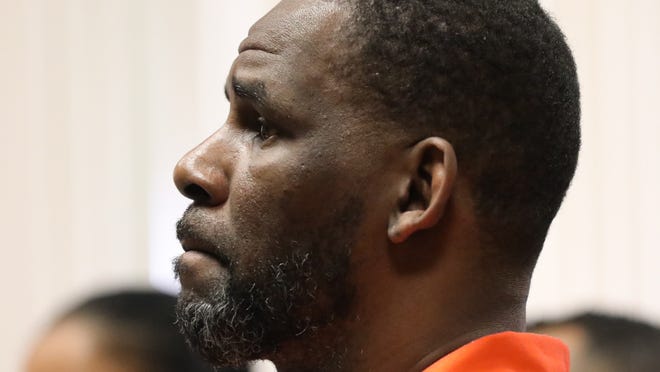The last pre-trial hearing before R. Kelly’s federal sex-trafficking trial begins next week featured a laundry list of what will and won’t be heard by the jury, including his secret marriage to then-teenage singer Aaliyah.
The outline of the story of Kelly and Aaliyah, who died in a 2001 plane crash, has long been known although Kelly has never admitted to wrongdoing. They secretly married in 1994, when she was 15 and he was 27 – allegedly after he bribed a government official to obtain a fake ID for her showing her age as 18, according to a 55-page motion filed by prosecutors last week. The marriage was soon annulled.
Now, according to the transcript of Tuesday’s hearing obtained by USA TODAY, prosecutors will be allowed to present evidence about how Kelly, now 54, allegedly had “sexual contact” with Aaliyah,referred to as “Jane Doe #1,” when she was underage.
In a pre-trial motion, prosecutors allege that Kelly believed she became pregnant, so he secretly arranged a marriage to protect himself from possible criminal charges, because a wife can’t be forced to testify against a husband.
“It’s clearly relevant and it clearly shows a motive for Racketeering Act Number One, so that is admissible,” U.S. District Judge Ann Donnelly ruled.
One of Kelly’s lawyers, Nicole Blank Becker, objected that discussing before the jury some aspects of the marriage episode may be “more prejudicial than probative,” the standard for whether to admit evidence at trial. The judge said she would follow established rules about what is admissible.
“Obviously, with all of these things I’m not going to permit hearsay,” she said.
The issue of the marriage is among a dozen allegations and potential witnesses that prosecutors sought Tuesday to bring up at Kelly’s trial, scheduled to start jury selection on Monday in the Eastern District of New York in Brooklyn.
During the hearing, Donnelly went over the prosecutors’ wish list of matters they want to present to the jury as other alleged instances where Kelly is accused of sexually or physically abusing people, even though Kelly is not charged with crimes in connection with these matters.
Instead, prosecutors will present them as “other acts” of alleged criminal behavior by Kelly, meant to bolster their case on the crimes for which he was indicted in July 2019.
The uncharged acts are “directly relevant to and inextricably intertwined with the evidence of the charged crimes,” the prosecutors argued in their motion.
Those charged crimes involve six women (two were girls at the time), and include child pornography, kidnapping, obstruction of justice, sex-trafficking and racketeering for purposes of sexual exploitation of children.
Prosecutors accuse Kelly of leading “a criminal enterprise” of managers, bodyguards and other employees, who allegedly helped Kelly to recruit women and underage girls for sex and pornography, and to cross state lines for that purpose.
Kelly has pleaded not guilty to all charges against him.
The accusers of the charged crimes have not been identified publicly, although Blank Becker said Aaliyah is Jane Doe #1 in the case and the prosecution’s description of Jane Doe #1 matches her.
The women accusers who testify will be called only by their first name in court, the judge ruled.

According to the hearing transcript, the Associated Press and Blank Becker, the judge mostly ruled for prosecutors but said some evidence will be excluded because it is too similar to other parts of the case aimed at showing Kelly engaged in racketeering in pursuit of women and girls he could abuse.
Donnelly said she will generally not allow questions aimed at revealing if any of the women have had mental health treatment. She said she will not allow the jurors to be told that one witness had worked as an exotic dancer years after she said she was abused.
Also likely to be excluded from the trial is any testimony about religious beliefs or that some of the women were directed to have sex with one another, the judge said.
Kelly’s defense team objected to the prosecution’s wish list, complaining they were “blindsided” by a motion filed just a few weeks before the trial is to begin. Blank Becker told USA TODAY the defense intends to press for “a fair and impartial trial, one based on fact.”
“If we do not hold the government to this standard, what is the point of the American justice system?” she said. “Our job as Mr. Robert Kelly’s defense team is to make sure his rights are protected and we fight for the truth.”
Kelly, who was in the courtroom Tuesday, has been locked up since he was indicted, mostly housed in a federal jail in Chicago. Last month he was moved to the federal Metropolitan Detention Center in Brooklyn.
One of his lawyers, Deveraux Cannick, told the judge that Kelly has lost money and gained weight while in jail, and needs to be measured for new clothing. He asked that court transcripts be provided at no cost because Kelly has been unable to work for two years.
“His funds are depleted,” Cannick said of his client, who left the courtroom after the hearing with his hands cuffed.
Kelly also faces similar sex-crime charges in federal court in Chicago and in state courts in Chicago and in Minneapolis. Delays due to the pandemic have left the New York case the first one to go to trial.
